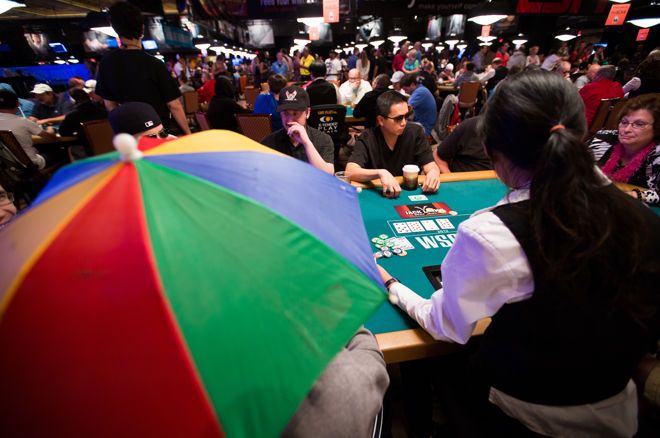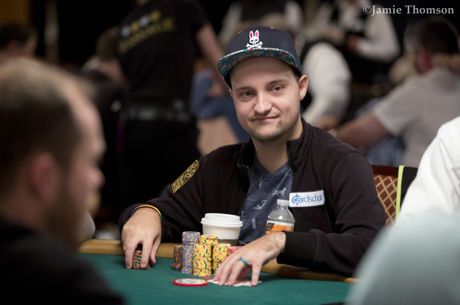You Are Less Unlucky at Poker Than You Think

One of the most common complaints I hear, even from good players, is how "unlucky" they are. Clearly, we cannot all be unlucky because for every one player who gets unlucky, somebody else needs to get lucky! Even then, the unluckiest person cannot be too unlucky due to something called the "" which informs us that the more we play the closer our luck will be to the "average."
So where does the misconception lie? Here are a few possible reasons why so many poker players sometimes — or a lot of the time — think of themselves as especially unlucky.
Selective Memory Bias
For starters, as humans we tend to ignore all the instances that went in our favor and remember only those that did not. This is known as "selective memory bias," an evolutionary response that prioritizes matters related to our survival over those related to our growth. In other words, for many of us, the pain of a loss is larger than the pleasure of a similar gain.
For example, most median middle class Americans would be devastated if they ever lost everything they owned. That level of pain would be nowhere near comparable to the potential pleasure of doubling their net worth.
This is a concept all too familiar to professional tournament players. It relates both to the saying "a chip and a chair" (made famous by Jack Straus's memorable comeback to win the 1982 World Series of Poker) and (more formally) to the Independent Chip Model (ICM).
The ICM model implies that, in tournament play, each additional chip is worth less than the previous one. Without getting into too much detail, this is a direct consequence of the simple fact that as long a player is "alive" anything can happen. Once again, here built into the structure and format of poker tournaments, survival is more important than growth. It's no wonder, then, that tournament players will often exhibit such selective memory bias upon busting.
Every Beat Is a Bad Beat
The second point has less to do with evolutionary inevitability and more with our inability to digest randomness. The fact is, just because we are ahead in a hand and probability-wise should win more often than not, that does not mean that we "deserve" to win. Not the whole pot, anyway.
A classic example is this would be the situation of aces versus kings when all the money goes in before the flop. To make matters more concrete, say that Alice holds A♣A♦ and Bob holds K♠K♥, with preflop action leading to both players being all in for 100 big blinds. Who deserves to win? If you answered Alice, I invite you to think again.
If Alice ends up winning, she got lucky! This is because she only had 82 percent chance of winning, thus "deserving" only 82 percent of the pot. However, the issue is that when she wins, she scoops the entire pot — all 100 percent of it! This means that she technically gets 18 percent "worth of lucky" every time she wins. By the same token, she gets 82 percent "worth of unlucky" when she loses.
Of course, her expected frequency of winning is larger than that of losing — about 4.55 times more frequent to be exact. That number "4.55" is not arbitrary, either. It is actually exactly the ratio of 82-to-18. In other words, every time Alice loses, she gives back all the extra "undeserved" money she got by winning. Similarly, when Bob wins (as an underdog) he gets back all the extra money he paid off "unfairly."
Rounding to the Nearest Hundred
A third issue with poker — or any game involving chance, for that matter — is that reality is generally worse (and often way worse) than our intuitive expectation. This misconception is not due to bad luck, but rather due our poor perception of what "unlikely" truly means.
Not only does "unlikely" not mean "impossible," it means that something will eventually happen, given enough time (again, due to the Law of Large Numbers). The face is, getting "one-outed" is something all professional poker players are huge favorites to experience multiple times in their careers. Even so, we still have issues believing it when it happens.
For further perspective, let's compute some quick odds of some rather improbable events.
First, let's examine an instance of trips versus a straight draw on the flop. Alice who holds the trips has offered to run it twice against Bob's straight draw — that is, two turns and rivers will be dealt, with half the pot awarded to the winner of each completed board.
Alice is approximately a 70 percent favorite to win each runout and thus around a 30 percent underdog to lose each one. Not only is this percentage is higher than what most people think, but also the chance of losing both hands (0.30 * 0.30 = 0.09 = 9 percent) is almost 1 in 10. This may seem low but it is nowhere near zero percent.
As a matter of fact, the above percentage is similar to that of losing with an overpair on the flop versus an opponent's lower overpair. So often, though, players in their minds will “round to the nearest hundred” and mentally translate a 90 percent edge (or a 70 percent edge or even a 55 percent edge) into a 100 percent one.
The point is that Alice is expected to lose a significant amount of the time even when she is ahead. Whether or not she realizes that, it is an another matter entirely.
Competition Affects Our "Luck"
Another subtle point is that the better our opponents, the worse our odds of winning. By that I mean that when all the money goes in, the chances of our being ahead go down.
Let's look again at the instance where Alice made trips. Let's also say that she plays it aggressively to the point that all the money eventually goes in on the flop.
Against a weak opponent, this can mean her opponent is likely to be drawing thin and thus have a low chance of winning the hand. But against good opponents, this will be less often the case for Alice, as not only will they have a better hand more frequently, but even when they do not, they will make sure to have a lot of outs (more "equity") and thus a better chance to win even when they are behind.
Thus might Alice's view of her luck be distorted. If she keeps losing with those trips time and time and again, it may be tempting for her to think she got unlucky instead of realizing that she keeps running into better players competing against her with a very strong range.
"Bad" Luck Is Necessary
One last thing to keep in mind regarding luck in poker. To many, the luck factor is possibly one of the most frustrating aspects of the game. This is understandable. Nobody likes to get the money in as a huge favorite, only to see an opponent catch his or her miracle card.
However, this luck factor is precisely the reason why we can make money in this game. This is the only way less skilled players and unsophisticated gamblers will give us action regardless of who we are.
In poker, anyone can learn the rules today and then sit down with the world champion and win the first hand they play. That cannot happen in chess. But that is also the reason why we do not see amateurs challenging Magnus Carlsen (the current World Chess Champion) for hundreds of thousands of dollars like they would a player like Phil Ivey.
Having a chance can make all the difference in the world, even if — or, rather, especially if it is a tiny chance. Don't be frustrated by luck in poker. Be glad about it!
Konstantinos "Duncan" Palamourdas is a math professor who specializes in the mathematics of poker. When not at the poker tables, Duncan can be found teaching poker classes at UCLA extension to people of all levels. His passion for simplifying complex poker concepts has also led to a poker book, contracted to be published by 2020. You can follow Duncan on twitter .









